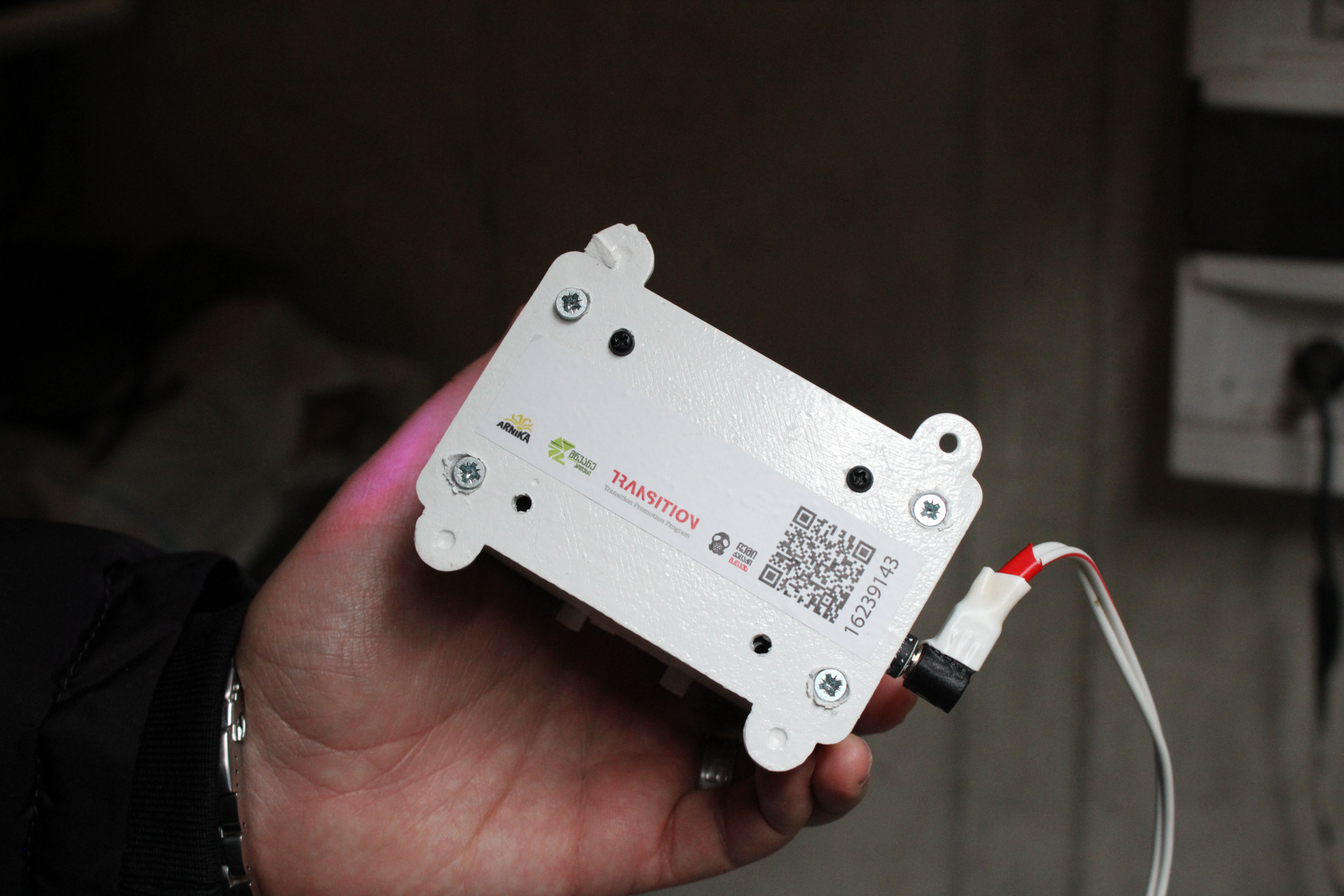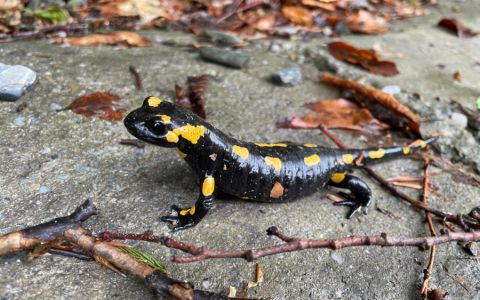TBILISI/PRAGUE - AirGE, the community network in Georgia, has reached 100 citizen science air pollution monitoring stations in 11 cities, despite the ongoing political crisis. This system, unique in the Caucasus, provides an alternative to weak state environmental monitoring and gives citizens access to information about what they breathe.The network was set up by the Tbilisi-based NGO Green Pole in partnership with Arnika, based in the Czech Republic. Air pollution is blamed for up to several thousand premature deaths a year in the capital alone, as well as massive economic losses.[1]
The AirGE stations measure concentrations of particulate matter (PM) - microscopic particles that bind toxic substances on their surface, are rapidly absorbed into the lungs and enter the bloodstream. PM contributes to the development and aggravation of a range of illnesses from asthma and chronic obstructive pulmonary disease to cardiovascular disease.[2] The stations also monitor volatile organic compounds (VOCs). The data is then published on a freely accessible website, embedded in an interactive map.
"One hundred stations is something of a milestone, but the most important thing is that we are giving Georgian citizens a useful tool. People can not only monitor air quality in their cities, but also assess trends - and most importantly, think about solutions. Ensuring the right to information and empowering citizens to demand their right to live in a healthy environment is the leitmotif of the AirGE network," says Giorgi Japaridze, the founder of Green Pole.
In some parts of Georgia, outdated industries are the main source of pollution. The situation is worst in Rustavi, from where air pollution is carried by the wind as far as to Tbilisi. Another major source of air pollution is heavy traffic, often based on old, highly polluting cars, especially in the case of Tbilisi, Kutaisi and other larger cities.
The air pollution monitoring stations are set up on the balconies or gardens of volunteers who are willing to provide a constant power supply and stable Wi-Fi. The Green Pole technical team then helps to solve any problems with the operation of the stations.
In addition to individual volunteers, several stations are run by different offices, cafes and educational institutions. For example, air quality is monitored by a school and the first zero-waste shop in Tbilisi, two different colleges and a community centre in Marneuli, or a social café and the "EuroClub" in Kvareli. Even the Czech Embassy and the United Nations Development Programme office in the capital have installed the stations.
The importance of the citizen monitoring network is underscored by the fact that the Georgian Ministry of Environment operates only 15 professional air monitoring stations across the country. By comparison, the Czech Republic, which is similar in size, has around 200 such stations within the network of the state Hydrometeorological Institute. In such a situation, citizen monitoring is an even more valuable source of information.
This glaring deficiency in the quality of monitoring was pointed out by analysis of Georgia’s state air quality monitoring system. Published in cooperation with the Czech Hydrometeorological Institute, it found that the system lacks stations outside the major cities.
Arnika has also published a study based on satellite imagery from the European Space Agency identifying the areas most affected by long-term pollution through Georgia. It also outlines the main causes of the poor air quality, namely obsolete industries, heavy traffic, or outdated heating.
The study includes a series of recommendations, such as innovation of obsolete industries, energy saving and efficiency, reinforcement of renewable energy sources, modernization of heating and cooling, investments in public transport, industrial pollution control, and others.
"In the current political crisis, concern for the environment is taking a back seat, but health problems and dirty air affect people regardless of who is in power. Citizen science projects are helping people everywhere to get the right information to protect their health, understand the causes of pollution and demand effective solutions from politicians. The AirGE network is the first step on this journey," adds Martin Skalsky, expert on environmental democracy from Arnika.
The AirGE network builds on previous successful community air quality monitoring projects implemented by Arnika. Belarusian AirMQ network includes 294 monitoring stations in 36 towns. Ukrainian EcoCity includes over 350 stations in 23 of Ukraine’s 24 regions, making it one of the largest networks of its kind in Europe, moreover, functioning still during the war in regularly shelled areas, it serves as a system to warn the population of war threats and has become part of the state crisis information system.
Citizen science stations for air monitoring started to boom around 2015 in response to inadequate state monitoring and thanks to the cheaper production of laser sensors, which now allow stations to be produced at minimal cost. It is estimated that there are now around 40-50 thousand such stations installed worldwide.
Georgian citizen air pollution monitoring was supported by the Transition Promotion Programme of the Ministry of Foreign Affairs of the Czech Republic.
For more information, please contact Arnika’s international PR officer, Jan Kašpárek (This email address is being protected from spambots. You need JavaScript enabled to view it., +420 770143103), or Nini Toidze from Green Pole (This email address is being protected from spambots. You need JavaScript enabled to view it., + 995 551 858 858)
 Arnika is an NGO founded in 2001 in the Czech Republic. Its mission is to protect nature and a healthy environment for future generations at home and worldwide. We have a long history of advocating for less waste and hazardous substances, healthy rivers and diverse nature, and strengthening the right of citizens to participate in the decision-making about the environment. You can find out more about Arnika HERE.
Arnika is an NGO founded in 2001 in the Czech Republic. Its mission is to protect nature and a healthy environment for future generations at home and worldwide. We have a long history of advocating for less waste and hazardous substances, healthy rivers and diverse nature, and strengthening the right of citizens to participate in the decision-making about the environment. You can find out more about Arnika HERE.
Green Pole is a Georgia-based NGO associated with the “My City Kills Me” civic movement. The movement aims to draw attention to the issue of severe air pollution in Georgian cities, especially Tbilisi, and its health consequences. You can find more information about Green Pole HERE.
Notes:
[1] - The World Health Organization states that “The burden of disease attributable to air pollution is now estimated to be on a par with other major global health risks such as unhealthy diet and tobacco smoking, and air pollution is now recognized as the single biggest environmental threat to human health”. In addition, new research highlights that the incidence of lung cancer among non-smokers is rising globally, with air pollution thought to be a significant factor. Georgia's capital Tbilisi is among Europe's most polluted metropolises.
[2] - As defined by the World Health Organization: Particulate matter (PM) refers to inhalable particles, composed of sulphate, nitrates, ammonia, sodium chloride, black carbon, mineral dust or water. PM can be of different sizes, with PM2.5 and PM10 the most common in the regulatory framework, as the health risks of those types are especially well documented. By entering the lungs and bloodstream, PM is capable of causing both ischemic heart disease and cerebrovascular (stroke) and respiratory impacts. Long-term exposure has been further linked to adverse perinatal outcomes and lung cancer.








